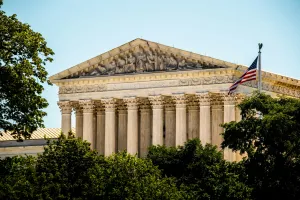Akhil and Vikram Amar, Recurring Columnists
Akhil Reed Amar is Sterling Professor of Law and Political Science at Yale University, where he teaches constitutional law in both Yale College and Yale Law School. After graduating from Yale College, summa cum laude, in 1980 and from Yale Law School in 1984, and clerking for then Judge (later Justice) Stephen Breyer, Amar joined the Yale faculty in 1985 at the age of 26. He is Yale’s only living professor to have won the University’s unofficial triple crown: the Sterling Chair for scholarship, the DeVane Medal for teaching, and the Lamar Award for alumni service.
Amar’s work has won awards from both the American Bar Association and the Federalist Society, and he has been cited by Supreme Court justices across the spectrum in over fifty cases – tops among living scholars under age 70. He was an informal consultant to the popular TV show, The West Wing, and his scholarship has been showcased on many broadcasts, including The Colbert Report, Morning Joe, AC360, Fox News, and Erin Burnett Outfront.
He is the author of more than a hundred law review articles and several books. The Words That Made Us: America’s Constitutional Conversation, 1760-1840, came out in May 2021 and its sequel, Born Equal: Remaking America’s Constitution, 1840-1920 will be published mid-September 2025. Amar also has a free weekly podcast, Amarica’s Constitution. A wide
assortment of his articles ae published in September 2025. Amar’s op-eds and video links to many of his public lectures and free online courses may be found at akhilamar.com.
--
Vikram D. Amar is the Daniel J. Dykstra Endowed Chair and a Distinguished Professor of Law at the UC Davis School of Law. From 2015 to 2023 Amar was the Dean and Iwan Foundation Professor of Law at the College of Law of the University of Illinois, Urbana-Champaign. He is an author on several books (including various volumes of the Wright & Miller Treatise on Federal Practice and Procedure and the Varat, Amar and Caminker Constitutional Law: Cases and Materials casebook) and over 100 academic articles and chapters in leading journals and compilations. His work in constitutional law, federal courts and civil procedure is regularly cited by academics and courts, including the U.S. Supreme Court. He also writes a widely read biweekly column focusing on constitutional matters for Justia.com, and has penned dozens of print and online op-eds in national newspapers and magazines. In addition to UC Davis and Illinois, Amar has taught law at (then) Boalt Hall School of Law (UC Berkeley), (then) UC Hastings College of Law, UCLA School of Law, and Northwestern Pritzker School of Law.
An elected Member of the American Law Institute and an invited member of the Task Force on American Democracy, Amar earned his bachelor’s degree from UC Berkeley and his juris doctor from Yale Law School, where he served as an Articles Editor for the Yale Law Journal. Following law school, Amar clerked for Judge William A. Norris of the United States Court of Appeals for the Ninth Circuit and for Justice Harry A. Blackmun of the United States Supreme Court before joining Gibson, Dunn & Crutcher, where he handled a variety of complex civil and white-collar criminal matters. He was the first person of South Asian heritage to clerk at the Supreme Court, and the first American-born person of Indian descent to become the dean of a major American law school.
Skrmetti and birth equality (Part V): How the case should have been analyzed
No Executive Taxation Without Clear Legislative Authorization
- Previous
- 1
- Next
